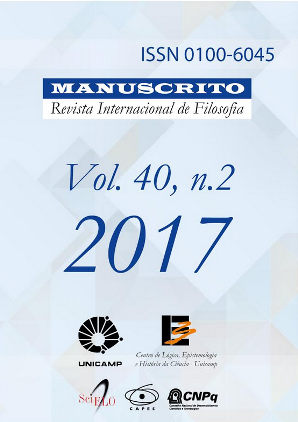Resumen
John MacFarlane’s truth relativism (2005, 2007, 2011, 2014) makes use of two notions of propositional truth: a monadic assessment sensitive one taken to be our ordinary truth notion, and a non-monadic one that is meant to account for the assessment sensitivity of the former notion. Some authors (Cappelen and Hawthorne, 2009, 2011; Montminy, 2009; Soames, 2011) contend that any theory introducing a technical non-monadic truth notion has to make sense of it (i.e. show that it is a truth notion) by defining or characterizing it in terms of ordinary monadic truth. First, I give some reasons why the relativist should not discard this approach to make sense of the notion of truth relative to a context of assessment. Second, I argue that an illuminating characterization of this notion must provide an answer to a dilemma Paul Boghossian (2011) poses to the relativist. Third, I single out the characterization that can answer this dilemma. Finally, I contend that the relativist still needs to show that this solution works for each case subject to a relativist treatment.Citas
BOGHOSSIAN, P. “Three kinds of relativism.” In S. D. Hales (ed.) (2011), pp. 53-69.
CAPPELEN, H., HAWTHORNE, J. “Reply to Lasersohn, MacFarlane and Richard”. Philosophical Studies, 156 (3), pp. 449-466, 2011.
CAPPELEN, H.; HAWTHORNE, J. Relativism and Monadic Truth. Oxford: Oxford University Press, 2009.
DUMMETT, M. “Truth.” Proceedings of the Aristotelian Society, 59 (1), 141162, 1959.
DUMMETT, M. Truth and Other Enigmas. Cambridge: Harvard University Press, 1978.
GARCIA-CARPINTERO, M. KÖLBEL, M. Relative Truth. Oxford: Oxford University Press, 2008.
HALES, S. D. A Companion to Relativism. Oxford: Wiley-Blackwell, 2011.
KÖLBEL, M. “Faultless disagreement.” Proceedings of the Aristotelian Society, 104, pp. 53-73, 2003.
KÖLBEL, M. “The evidence for relativism.” Synthese, 166, pp. 375-395, 2009.
MACFARLANE, J. “Future contingents and relative truth.” The Philosophical Quarterly, 53 (212), pp. 321-336, 2003.
MACFARLANE, J. “Making sense of relative truth.” Proceedings of the Aristotelian Society, 105, pp. 321-339. 2005.
MACFARLANE, J. “Relativism and disagreement.” Philosophical Studies, 132, pp. 1731, 2007.
MACFARLANE, J. “Simplicity made difficult.” Philosophical Studies, 156 (3), pp. 441448, 2011.
MACFARLANE, J. “Truth in the garden of forking paths.” In M. García-Carpintero and M. Kölbel (eds.) (2008), pp. 81-102.
MACFARLANE, J. Assessment Sensitivity: Relative Truth and its Applications. Oxford: Clarendon Press, 2014.
MEILAND, J. “Concepts of relative truth.” The Monist, 60, pp. 568-582, 1977.
MONTMINY, M. “Contextualism, relativism and ordinary speakers’ judgments.” Philosophical Studies, 143, pp. 341-356, 2009.
RECANATI, F. STOJANOVIC, I., VILLANUEVA, N. Context-Dependence, Perspective and Relativity. Berlin/New York: De Gruyter Mouton, 2010.
SMITH, B. C. “Relativism about truth and predicates of taste.” Filosofia Unisinos, 13 (2), pp. 250-265, 2012.
SMITH, B. C. “Relativism, disagreement and predicates of personal taste.” In F. Recanati, I. Stojanovic and N. Villanueva (eds.) (2010), pp. 195225.
SOAMES, S. “True at.” Analysis, 71 (1), pp. 124-133, 2011.
TARSKI, A. “The concept of truth in formalized languages.” In A. Tarski (1956), pp. 152-278.
TARSKI, A. Logic, Semantics, Metamathematics: Papers from 1923 to 1938. Oxford: Clarendon Press, 1956.

